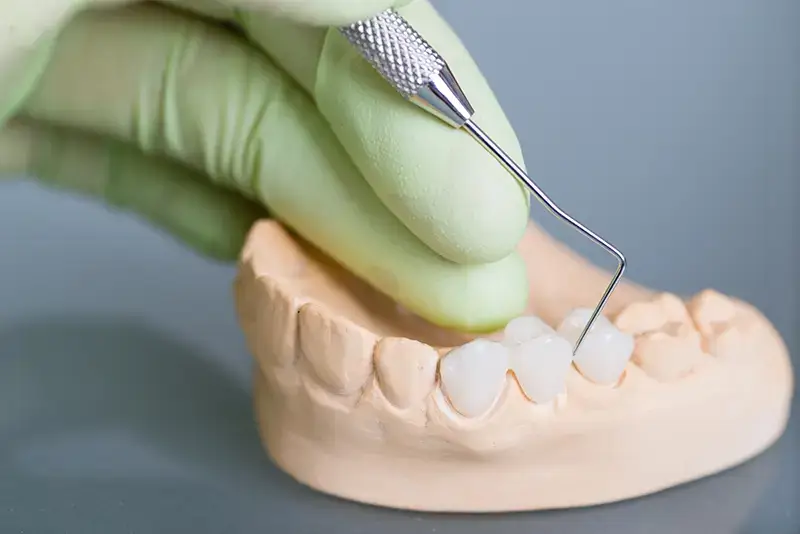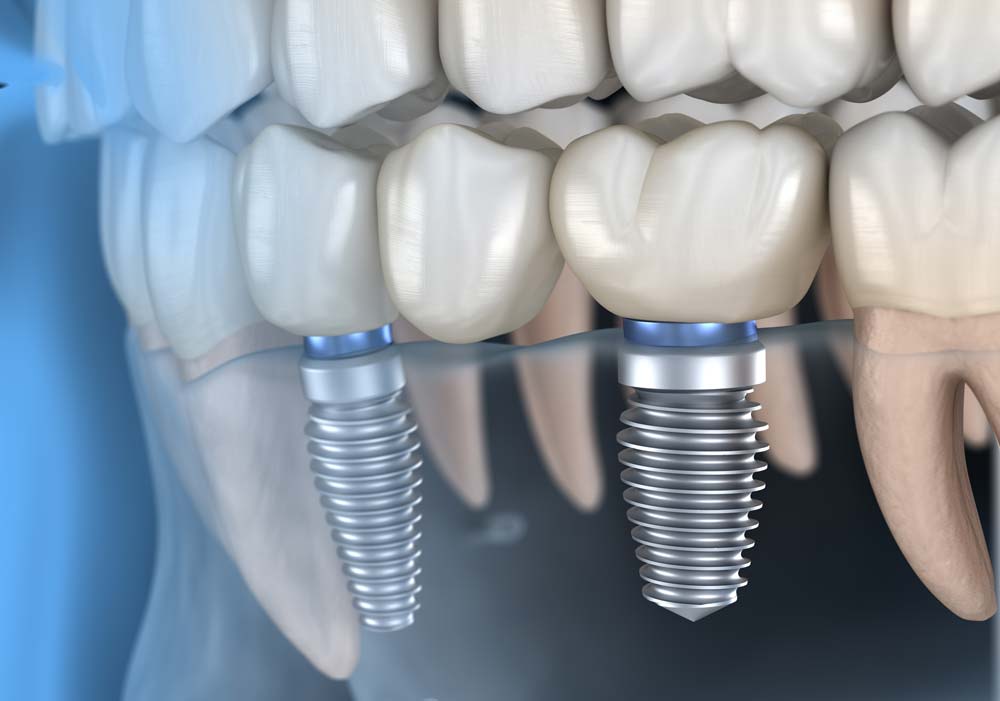Having an incomplete smile can take a toll on your quality of life, health, and comfort. Thankfully, modern dentistry and dental treatment technology offer an array of treatment options, such as dentures, dental bridges, and dental implants, that can restore the form and function of your smile while supporting oral health and general wellness.
The first step to restoring your smile is knowing that it’s possible. The second step is working with a dentist to choose your treatment plan. Understanding the various tooth replacement options that are available, along with their benefits and potential drawbacks, can help you determine the type of treatment that might be right for you.
Restoring Smiles With Dentures
Traditional dentures are a type of dental prosthetic designed to fit snugly over the upper jawbone (maxillary arch) and lower jawbone (mandibular arch). They consist of a prosthetic gum-colored base that supports replacement teeth. There are both full and partial dentures, making them a versatile option for patients who are missing several or all of their teeth.
Benefits
- Custom-Designed: Modern dentures are custom-designed for a perfect fit and natural look.
- Restores Chewing Ability & Speech: Dentures replace missing teeth all at once, restoring both function and appearance.
- Supports Facial Muscles: Wearing dentures supports the strength of facial muscles.
- Boosted Confidence: Dentures restore the look of your smile.
- Quick Treatment Process: The denture treatment process is relatively fast compared to other options like implants.
- Non-Invasive: Depending on whether you require any tooth extractions, getting dentures is usually a non-invasive process.
- Cost-Effective: Dentures are one of the most affordable treatment options for replacing missing teeth.
- Simple Maintenance: Dentures are relatively easy to care for and won’t add too many steps to your regular oral hygiene routine.
The Potential Disadvantages
- Adjustment Period: With new dentures, there’s always a short adjustment period that can involve difficulty speaking and eating, as well as some discomfort. However, this is only temporary.
- Adhesives: Traditional denture wearers usually need to use dental adhesives to hold their dentures in place.
- Instability: Traditional dentures can sometimes move around or slip inside the mouth, especially if they do not fit properly.
- Soft Tissue Sores: If dentures do not fit properly, they can chafe the soft tissues, causing sores.
- Ongoing Adjustments: As your jawbone changes over time, you will likely need to have your dentures adjusted to maintain a proper, comfortable fit.
- Jawbone Degeneration: Traditional dentures do not stimulate the jawbone, so the jawbone will likely degenerate over time.
Good Candidates for Dentures
Good candidates for dentures include patients who have significant tooth loss and/or teeth that are damaged and decayed beyond repair. Patients must be committed to practicing good oral hygiene and also be willing to adapt to wearing dentures.
When Are Dentures the Best Option?
Dentures are a good option for patients who prefer a faster, more affordable, and less invasive treatment process. Additionally, dentures are a good option for patients with gum disease or other factors that disqualify them for other tooth replacement options.
Restoring Smiles With Bridges
A dental bridge is designed to replace one or multiple consecutive missing teeth. It consists of one or two anchors that vary in style, depending on the type of bridge, and replacement teeth in between.
Benefits
- Restores Function: Dental bridges improve chewing and speaking.
- Natural Aesthetic: Bridges are custom-designed to restore the appearance of the smile with a natural look.
- Minimally Invasive: Depending on the type of bridge, this treatment can be quick and minimally invasive.
- Easy Maintenance & Care: Bridges are not removable, so patients care for them like their natural teeth.
The Potential Disadvantages
- Neighboring Teeth: Bridges typically require some alterations to the healthy teeth that neighbor the tooth gap. These alterations can weaken these natural teeth, increasing their risk of future issues.
- Oral Health Risk: Patients must clean thoroughly around the bridge to prevent food debris and plaque from becoming trapped. Otherwise, their risk for gum disease and tooth decay can increase.
- Lifespan: Bridges don’t typically last forever. With proper care, they can last up to 10+ years, but most will require maintenance or replacement at some point.
- Jawbone Degeneration: Like dentures, dental bridges don’t provide the stimulation that prevents bone loss and supports the health of the jawbone.
Good Candidates for Bridges
Patients who are missing one tooth or multiple teeth in a row with healthy teeth adjacent to the gap are good candidates for bridges. Patients must also have generally good oral health and be committed to practicing good oral hygiene.
When Are Dental Bridges the Best Option?
Dental bridges are often the best option for patients with multiple consecutive missing teeth who do not want to wear a partial denture and desire a minimally invasive, affordable treatment option.
Restoring Smiles With Dental Implants
Dental implants are a permanent tooth replacement option that is most similar to natural teeth. An implant consists of three basic parts:
- Implant Anchor: A screw-like prosthetic made of biocompatible material that’s inserted directly into the jawbone and mimics a tooth’s natural roots.
- Implant Abutment: The abutment connects to the implant and supports the restoration.
- Permanent Restoration: The restoration is the only visible portion of the implant and is typically made of tooth-colored porcelain. Implants can be dental crowns, dental bridges, or dentures.
Benefits
- Natural Look, Feel, & Function: Implant-supported restorations look, feel, and work just like natural teeth.
- Always Stable: Like natural roots, implants provide a completely stable foundation for a tooth replacement.
- No Adhesive or Sores: They don’t require adhesive, never move around in the mouth, and don’t result in soft tissue sores.
- Supports Jawbone Health: Dental implants stimulate the jawbone, triggering bone regeneration to maintain the jawbone’s strength and health while preserving natural facial features.
- Versatile Options: Dental implants can be used to replace one, several, or all of a patient’s teeth by supporting a variety of different restorations.
- Permanent: Dental implants are designed to last a patient’s lifetime.
- Easy Care: Patients care for dental implants like natural teeth, with good oral hygiene habits.
The Potential Disadvantages
- Lengthy Treatment Process: Getting implant-supported restorations requires a more complex, lengthy treatment process with multiple appointments and, sometimes, multiple procedures.
- Requires Oral Surgery: Dental implants are placed with a simple oral surgical procedure. Additionally, some patients require a bone or soft-tissue grafting procedure before receiving an implant.
- More Costly: The initial treatment costs are typically higher for dental implants.
Good Candidates for Implants
Candidates for dental implants must be healthy enough to undergo and heal from oral surgery. They must have enough bone to support the implants they receive. Additionally, they must have generally good oral health with no current periodontal disease, while also being willing to abstain from smoking and tobacco use throughout the treatment process.
When Are Dental Implants the Best Option?
Dental implants are a good option for patients who want to support their oral health while restoring their smiles with a highly natural-looking, feeling, and functioning treatment option. Although the initial investment is higher and the process is more complex, the lifelong benefits of dental implants do outweigh these considerations for many patients.
Restore Your Smile & Confidence at Kardynal Dental
The tooth replacement option that’s right for you will depend on your current oral health, unique needs, and treatment goals. The best way to determine which treatment plan is right for you is to schedule a consultation with a dentist.
Kardynal Dental provides comprehensive restorative dental care, including tooth replacement with full and partial dentures, dental bridges, dental implants, and implant-supported restorations. Through a consultation and examination, we can help you determine which treatment options are available to you and help you select a personalized treatment plan that fits into your lifestyle, budget, and future oral health goals. Schedule your consultation today!


